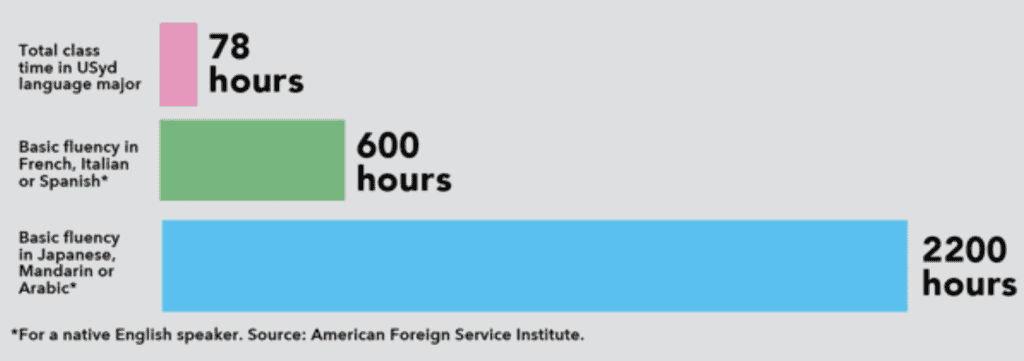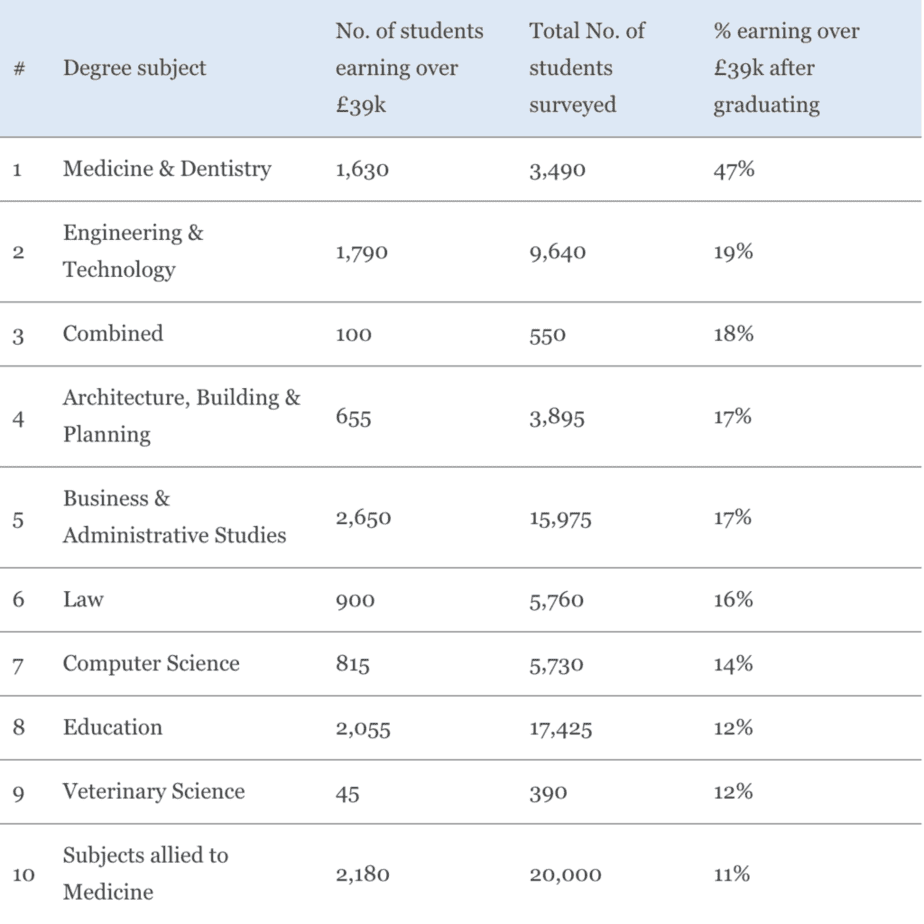
Unless you’re incredibly wealthy or live in Sweden, studying for a university education can be incredibly expensive. Regardless of your financial status, studying for a 4-year college degree is a huge time commitment. Think of it as a giant tax on learning that will possibly loom over you for the rest of your days.
If you’re going to study for a degree, you want to know you’re making the right choice and you’re not wasting the opportunity of a college education.
Studying for a language degree is only worth it if you make it worth it. However, be aware that studying a language at university isn’t the most time-effective or cost-effective way to learn a language. You can definitely learn a language independently without doing a degree in it. If you want to be more ’employable’ after graduation, those who acquire another skillset along with a language tend to fare much, much better in the job market.
The truth: university language courses aren’t effective for language learning
Anyone who has learned a second language to fluency knows that the most important activity for reaching a high level is to simply spend time with the language.
Is a university lecture hall a good place to do this? A language lab? A seminar room?
The American Foreign Service Institute calculated how many class hours were completed by language students at the University of Sydney.

Although the above illustrates only one example, it does show us that a university languages course can fall way short of the mark in reaching fluency.
So, even if we disregard the incredibly high costs of a degree and look at this from a purely practical sense, we know that studying a language degree isn’t a good way to learn it.
Pursuing a language degree is often face-slappingly expensive
The ludicrous expense of a language degree becomes obvious if we again consider how we actually learn a language. As mentioned above, we learn a language by spending time with the said language.
This involved hundreds or thousands of hours reading, listening, writing, and speaking in our target language.
All of the above activities are insanely cheap if we compare them to 4 years of tuition at a western university.
- 1 year of Spanish tuition at a University in the UK = £9000 (minimum)
- 1 set of textbooks (beginner to advanced) = £100 (roughly)
- 1 year of Duolingo = FREE
As someone who has learned a second language to fluency as an adult (and dropped out of a language degree), I can confirm that all of the activities that took my language skills to the highest heights were free, or incredibly cheap.
I think the most cost-effective things I’ve bought in my quest to learn Chinese have been the Boya Textbooks, the Pleco App Basic Bundle ($30), and Chinese books from the Kindle Store.
A language degree isn’t a qualification
No companies out there care about the language you’ve graduated in.
They care about the skills you can perform in that language.
Say you’re a boss at a translation company and you’re hiring a new translator. Would you prefer someone who is literally fluent in Spanish, or would you prefer someone who has a degree in Spanish but whose Spanish skills could be better?
You would probably prefer a graduate who not only had excellent language skills but also studied translating and interpreting, right?
Think about it like this:
If you graduate with a degree in Medicine, you are then qualified to enter medical school and train as a doctor.
If you graduate with a degree in French, you aren’t qualified for anything. Your ability to speak French is your qualification.
So, if you’re a language enthusiast, the answer isn’t to ignore your passion and study something you hate at university so you can earn more money.
It’s to combine your passion for languages whilst qualifying in another marketable skill.
Career options for language graduates
According to the data, language graduates don’t earn as much post-graduation compared to graduates of other subjects.

Now, usually when you perform a Google search of ‘What jobs can I get with a degree in languages?’ You will get a list comprised of the following sectors:
- Translating and Intepreting
- Bilingual Sales
- Hospitality Management
- Teaching
- Journalism
- Marketing
But looking at the list, you will realise these job roles require other skills in conjunction with languages.
Do you see where I’m going with this?

Now admittedly, this post may have seemed rather doom and gloom thus far to budding university language students.
The goal of this post isn’t to put you off learning languages. The goal is to help you consider how to use your language skills to greater effect, whilst using university as a vehicle to do so.
Think about it like this:
How many law graduates get pumped out each and every year? I don’t have the numbers, but there are a lot.
How about Italian graduates? Much fewer, but there are millions of bilingual Italians out there already.
What about Italian-speaking law graduates? Granted, they still exist, but as an Italian-speaking law graduate, you’re starting to set yourself apart from the crowd.
By combining skill sets, you are niching down to a point where you’re really demanded by a few employers, as opposed to being barely considered by many.
Joint honours degrees
If you are hell-bent on studying a language degree, you can always compromise by doing a joint honours degrees (or dual honours) degree in a language and another subject.
Below are some good examples of joint honours programs I’ve found. Bear in mind that the following courses are UK specific, but they should serve as a jumping-off point for what you can find at universities in your country and throughout the rest of the world.
It’s possible to study more than one language in a joint honours degree at many institutions, and at some schools, you can even study three!
- University of Birmingham: Russian and International Relations
- University of Manchester: Japanese and Business Managament
- University of Sheffield: German and Music
- University of St. Andrews: Chinese and Economics
- University of Leeds: Arabic and Film Studies
Passion for language matters
Retired football player Jermaine Defoe was once asked by a career counselor what he would be if he couldn’t be a professional football player.
His answer?
“Nothing.”
Some people are lucky enough to find their undying passion very early on in life. If that’s you, then congratulations. I’m actually quite jealous!
My point is, if you live, breathe, eat and sleep languages, then much of the above advice in this post becomes moot.
Learning about something you enjoy isn’t seen as an option to millions of other university students all over the world, often because of fear. They might be scared of what their parents might say or how much they will earn in 10 years. They might just be scared of being honest with themselves about what they genuinely enjoy doing.
Seriously, have we all completely abandoned the idea of doing what we enjoy in life, simply because a degree in town planning or dentistry might pay us a few more thousand pounds each year?
If you love languages more than anything else in this world, with hard work and a bit of imagination, you will use a languages degree to make a living.
And you won’t let some random guy on the internet tell you it’s a waste of time and money!
Further Reading
- 100+ MANDARIN LEARNING RESOURCES: THE FASTEST WAY TO FLUENCY
- LEARNING CHINESE: 15+ LISTENING TOOLS PERFECT FOR BEGINNERS
- THE ULTIMATE GUIDE TO LEARNING CHINESE IN CHINA
- THE 24 BEST MANDARIN STUDY RESOURCES FOR BEGINNERS
- 14 REASONS WHY YOU SHOULD LEARN MANDARIN CHINESE
- IS IT EASY TO LEARN MANDARIN CHINESE?
- THE 21 BEST APPS TO LEARN CHINESE
- STUDYING MANDARIN AT A UNIVERSITY IN CHINA: WHAT YOU NEED TO KNOW
